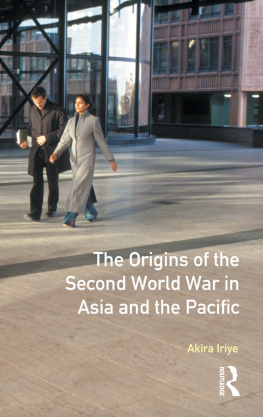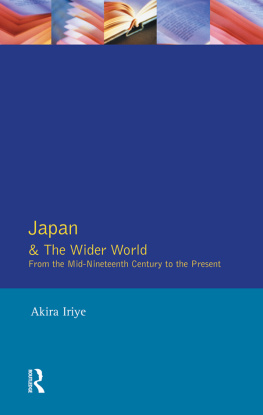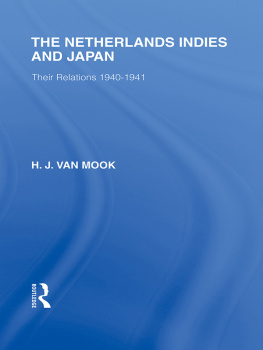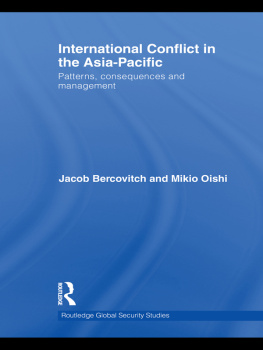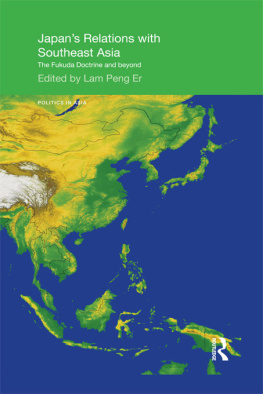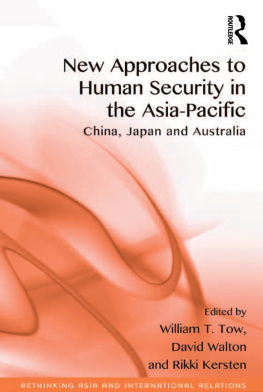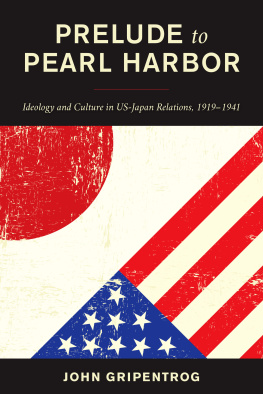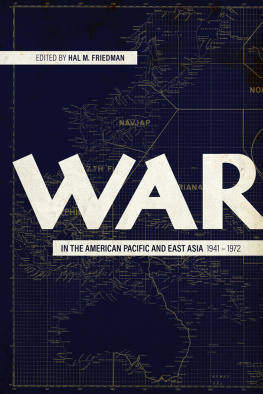
THE ORIGINS OF THE SECOND WORLD WAR IN ASIA AND THE PACIFIC
ORIGINS OF MODERN WARS
General editor: Harry Hearder
Titles already published:
THE ORIGINS OF THE FRENCH REVOLUTIONARY WARS
T.C.W. Blanning
THE ORIGINS OF THE CRIMEAN WAR
David M. Goldfrank
THE ORIGINS OF THE ITALIAN WARS OF INDEPENDENCE
Frank J. Coppa
THE ORIGINS OF THE AMERICAN CIVIL WAR
Brian Holden Reid
THE ORIGINS OF THE WARS OF GERMAN UNIFICATION
William Carr
THE ORIGINS OF THE SOUTH AFRICAN WAR 18991902
Iain R. Smith
THE ORIGINS OF THE RUSSO-JAPANESE WAR
Ian Nish
THE ORIGINS OF THE FIRST WORLD WAR (Second Edition)
James Joll
THE ORIGINS OF THE RUSSIAN CIVIL WAR
Geoffrey Swain
THE ORIGINS OF THE SECOND WORLD WAR IN EUROPE
P.M.H. Bell
THE ORIGINS OF THE SECOND WORLD WAR IN ASIA AND THE PACIFIC
Akira Iriye
THE ORIGINS OF THE GREEK CIVIL WAR
David H. Close
THE ORIGINS OF THE KOREAN WAR (Second Edition)
Peter Lowe
THE ORIGINS OF THE VIETNAM WAR
Anthony Short
THE ORIGINS OF THE ARAB-ISRAELI WARS (Second Edition)
Ritchie Ovendale
THE ORIGINS OF THE PRESENT TROUBLES IN NORTHERN IRELAND
Caroline Kennedy-Pipe
THE ORIGINS OF THE SECOND WORLD WAR IN ASIA AND THE PACIFIC
Akira Iriye

First published 1987 by Pearson Education Limited
Published 2013 by Routledge
2 Park Square, Milton Park, Abingdon, Oxon OX14 4RN
711 Third Avenue, New York, NY 10017, USA
Routledge is an imprint of the Taylor & Francis Group, an informa business
Copyright 1987, Taylor & Francis.
All rights reserved. No part of this book may be reprinted or reproduced or utilised in any form or by any electronic, mechanical, or other means, now known or hereafter invented, including photocopying and recording, or in any information storage or retrieval system, without permission in writing from the publishers.
Notices
Knowledge and best practice in this field are constantly changing. As new research and experience broaden our understanding, changes in research methods, professional practices, or medical treatment may become necessary.
Practitioners and researchers must always rely on their own experience and knowledge in evaluating and using any information, methods, compounds, or experiments described herein. In using such information or methods they should be mindful of their own safety and the safety of others, including parties for whom they have a professional responsibility.
To the fullest extent of the law, neither the Publisher nor the authors, contributors, or editors, assume any liability for any injury and/or damage to persons or property as a matter of products liability, negligence or otherwise, or from any use or operation of any methods, products, instructions, or ideas contained in the material herein.
ISBN 13: 978-0-582-49349-0 (pbk)
British Library Cataloguing In Publication Data
Iriye, Akira.
The origins of the Second World War in Asia and the Pacific.
(Origins of modern wars)
1. World War, 19391945 Causes
2. World War, 19391945 Japan
I. Title II. Series
940.5311 D742.J3
Library Of Congress Cataloging-In-Publication Data
Iriye, Akira.
The origins of the Second World War in Asia and the Pacific.
(Origins of modern wars)
Bibliography: p.
Includes index.
1. World War, 19391945 Causes. 2. Japan Foreign relations 19121945. 3. World War, 19391945 Diplomatic history. 4. World War, 19391945 Pacific Area. 5. World War, 19391945 Asia. I. Title. II. Series.
D742.J31751987 940.53112 86-2763
CONTENTS
Professor Akira Iriyes contribution to the Origins of Modern Wars series deals with the Second World War in Asia and the Pacific, and so complements Mr Philip Bells volume on the Second World War in Europe. Professor Iriyes study casts a brilliant shaft of light on the Japanese and American policies which led to the fatal denouement at Pearl Harbor. If the motives of all Japanese ministers were basically the same to secure economic independence and a greater degree of authority for Japan in Asia and the Pacific, their theories on how those aims could be achieved varied profoundly. A special value of this book is the authors familiarity with the domestic political struggles in Tokyo, and his profound understanding of the complexities in a situation which at first sight appears a simple one. He shows how policies with basic flaws could seem to have an unanswerable logic of their own, and how nuances of difference in strategic hypotheses could come to have a catastrophic significance.
From the early 1930s onwards there were some Japanese ministers whose recommendations, if accepted, would have led away from war, and others whose recommendations would lead, often unwittingly, towards war. Once again, as so often in this series, it is made apparent that the ideas of individual ministers, officials or diplomats influence events, sometimes in a fundamental sense. They are by no means always at the mercy of forces beyond their control. Akira Iriye demonstrates that Japanese ministers would have preferred to avoid war with the USA and Britain, but were prepared in degrees which varied from one minister to another to face war if it became, by their judgement, unavoidable. The emperor remained throughout more doubtful about the wisdom of going to war with the USA than were his ministers. The army leaders were more eager for war than the civilians. It would be tempting to argue that such is always the case, but Dr Peter Lowe has shown that American military leaders before the Korean War (apart from General MacArthur, about whom most generalizations would be misleading) were more cautious than were Truman and the civilians in Washington. While it is reasonable to assume that generals are more belligerent than civilian ministers simply because war is the raison dtre of generals, it is also true that generals are often more aware than their civilian colleagues of the unpreparedness of their armies.
The miscalculations, or failures of imagination, by political leaders as causes of wars are becoming familiar features of this series. They were present in James Jolls Origins of the First World War, Ian Nishs Origins of the Russo-Japanese War of 1904 and T. C. W. Blannings Origins of the French Revolutionary Wars. In the present work by Akira Iriye misconceptions and miscalculations play a subtle role. When Japan went to war with China in 1937 the Japanese had probably assessed the relative military strengths of the two nations correctly. But they failed to appreciate the complexity and fluid nature of the diplomatic situation in the world as a whole. That complexity is illustrated by the fact that Nazi Germany had military advisers in China, and Soviet Russia was sending arms to Chiang Kai-sheks government in spite of the presence in China of Communists hostile to Chiangs regime. Professor Iriye will probably surprise many readers by his account of how Hitlers government was called upon to mediate between China and Japan, and might possibly have succeeded in doing so if Chiang had been prepared to compromise, though his refusal to do so was understandable enough. Not until 1938 did Hitler finally decide to side with Japan against China.
Next page
